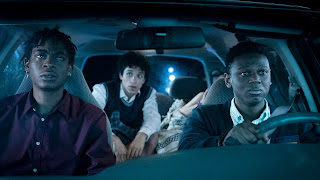I began to scroll, reading messages that weaved throughout their college years leading to adulthood punctuated by family deaths, the birth of children, and concluding in the last few years with their final run-in at an event of a mutual friend. I returned her phone to her and “lovingly” stated, “Girl, you were a whole -------!” Luckily thanks to our no-holds-barred style of communication, she seemingly took no offense but, instead, burst into laughter before genuinely asking, “You think so?” I stated, “Absolutely. You were NOT the victim in this story; HE was!” I’ll spare the details that brought me to my conclusion but, by the end of dinner, she shared genuine remorse regarding their detachment, which led us to the topic of if there was anything she should or needed to do. I simply stated, “Reach out and apologize for your part in the demise of the relationship. If nothing else, you’ll set yourself free and maybe him too.”
And so, at that dinner table, with the evening sun beautifully setting on the verandah of the restaurant (and with a bit of “liquid courage” along with me rooting her on) she did…and he immediately responded—addressing her by the playful nickname he’d given her back in their college days—thanked her for her kind words and apology and, just like that, a friendship was renewed. And with both being single, it could not be denied that the possibility of more now existed in their space. At the end of the night, she stated that moment was the highlight of her entire trip (even wondering if that was the Divine reason she even came to the conference) and thanked me for helping her reconnect with a person she truly missed having in her life. I was happy to have helped a friend in such a meaningful way. However, I know I would not have been able to offer such advice if I had not begun to put this action more into practice in my own life.However, what I’ve learned is that the true art of the apology is acting on that small, still voice that tells you to give the apology before it has to be asked for. It has been the most empowering and liberating behavior I’ve learned to embrace in recent years; that is, to grant that gift to a person without them having to seek it. Because truth is, most of us are in tune with our inner voice that tugs on our conscience and heart when we’ve done something or someone wrong; the growth is in acting on that inner voice without needing to be told you should.
Fortunately, in putting this into practice, the Universe returned the example to me recently in the form of a coworker (surprisingly, an older, white gentleman) who apologized for not speaking to me in the break room weeks earlier. I barely remembered but also was totally unbothered by the incident in the hustle and bustle of work life (and in getting coffee), but I appreciated his humility and humanity. It was an opportunity for me to delightfully be on the receiving end of experiencing that which I’m practicing to more freely give. And it was a reminder that nothing is ever lost by giving an apology, even if the recipient genuinely states it isn't necessary. For what it most certainly does is give others an example of how to extend peace and grace to those who need it and, in turn, increase one's own.Ironically, on the departure day of my business trip back home, I woke up with a tiny tug of regret in my own heart for addressing my friend’s past relationship actions in such a “colorful way” during dinner despite her laugher. As I waited for my Uber, I sent her a farewell text message along with an apology for my offensive language toward her. She responded that no apology was needed and that she in fact appreciated when folks kept it “all the way real” with her but thanked me for doing so anyway. It was a reminder that we not only should practice what we preach on these journeys to being our best selves, but that when we’ve reached a milestone in our growth, we have a responsibility to preach what we’ve practiced as well in hopes that it will inspire others to do the same.















